| | |||||||||||||||||||||
| |||||||||||||||||||||
| |||||||||||||||||||||
| |||||||||||||||||||||
The mayoral election of 1993 in Pittsburgh, Pennsylvania was held on Tuesday, November 2, 1993. The incumbent mayor, Sophie Masloff of the Democratic Party, chose not to run for re-election.
| | |||||||||||||||||||||
| |||||||||||||||||||||
| |||||||||||||||||||||
| |||||||||||||||||||||
The mayoral election of 1993 in Pittsburgh, Pennsylvania was held on Tuesday, November 2, 1993. The incumbent mayor, Sophie Masloff of the Democratic Party, chose not to run for re-election.
State Representative Tom Murphy, who had finished in second to Masloff during the previous election cycle's Democratic primary won the party's nomination, defeating City Councilman (and future Pennsylvania Auditor General) Jack Wagner. Murphy had been well regarded for his work in the legislature for projects designed to improve the unity and community feel of city neighborhoods. However, he also gain a reputation as being difficult to work with. Nonetheless, his previous run for mayor had laid a strong foundation for a primary win.
| Party | Candidate | Votes | % | |
|---|---|---|---|---|
| Democratic | Tom Murphy | 49,530 | 71.9 | |
| Democratic | Jack Wagner | 19,338 | 28.1 | |
| Total votes | 68,868 | 100 | ||
A total of 86,414 votes were cast. Although Murphy won by a large margin, as is typical of Pittsburgh Democrats, he lost the city's black vote. City Councilman Duane Darkins, an activist for the short lived black progressive movement The Campaign for a New Tomorrow, ran on the platform of giving a voice to the city's minorities. [1] Kathy Matta, a nonprofit director, was the Republican nominee.
| Party | Candidate | Votes | % | ±% | |
|---|---|---|---|---|---|
| Democratic | Tom Murphy | 57,172 | 66.2 | ||
| Independent | Duane Darkins | 13,271 | 15.4 | ||
| Republican | Kathy Matta | 12,058 | 14.0 | ||
| Independent | Jeff Hitchcock | 3,913 | 4.5 | ||
| Turnout | 86,414 | ||||
| Democratic hold | Swing | ||||
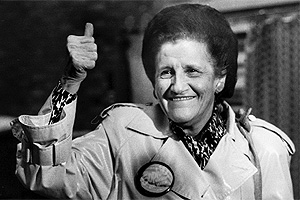
Sophie Masloff was an American politician. A long-time member of the Democratic Party and civil servant, she was elected to the Pittsburgh City Council and later served as the mayor of Pittsburgh from 1988 to 1994. She was the first and to date only woman and the first Jew to hold that office.
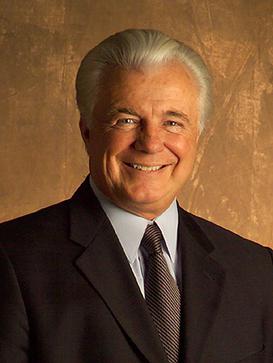
Robert E. O'Connor Jr. was an American politician who was the Mayor of Pittsburgh, Pennsylvania from January 3, 2006, until his death.
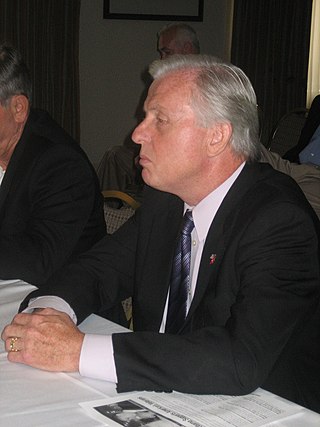
Jack E. Wagner is an American Democratic politician from the Commonwealth of Pennsylvania. He served as Pennsylvania Auditor General, and previously served in the State Senate and Pittsburgh City Council.

The mayoral election of 2007 in Pittsburgh, Pennsylvania was a special election held on Tuesday, November 6, 2007. The incumbent mayor, Luke Ravenstahl of the Democratic Party faced Republican challenger Mark DeSantis, a telecommunications executive and adjunct professor at Carnegie Mellon University. The race was notable for the strength of its Republican challenger, rare in Pittsburgh, and the election of such a young mayor, Ravenstahl being 27 years old at the time. Ravenstahl was elected with a comfortable margin in an election marked by unusually cold weather but record voter turnout.

The 2008 congressional elections in Pennsylvania was held on November 4, 2008, to determine who will represent the state of Pennsylvania in the United States House of Representatives. Pennsylvania has 19 seats in the House, apportioned according to the 2000 United States census. Representatives are elected for two-year terms; those elected will serve in the 111th Congress from January 4, 2009, until January 3, 2011. The election coincides with the 2008 U.S. presidential election.

Pittsburgh held a mayoral election on November 3, 2009. Incumbent mayor Luke Ravenstahl, a Democrat, defeated his two independent challengers by a wide margin. The 2009 election was the first regular-cycle election in which Ravenstahl participated; he was originally appointed as an interim mayor to succeed Bob O'Connor and subsequently won a special election in 2007.

The mayoral election of 2005 in Pittsburgh, Pennsylvania was held on Tuesday, November 8, 2005. The incumbent mayor, Tom Murphy of the Democratic Party chose not to run for what would have been a record fourth straight term.

The mayoral election of 2001 in Pittsburgh, Pennsylvania was held on Tuesday, November 6, 2001. The incumbent mayor, Tom Murphy of the Democratic Party was running for a record-tying third straight term.

The mayoral election of 1989 in Pittsburgh, Pennsylvania was held on Tuesday, November 7, 1989. The incumbent mayor, Sophie Masloff of the Democratic Party chose to run for her first full term after having ascended the mayor's office from the position of President of City Council upon the death of long-time mayor Richard Caliguiri. While she met challengers in the Democratic primary, she was uncontested in the general election.

The Mayoral election of 1977 in Pittsburgh, Pennsylvania was held on Tuesday, November 1, 1977. The incumbent mayor, Richard Caliguiri, had ascended to the office just 10 months earlier, after longtime mayor Pete Flaherty resigned to take a position in the newly formed Jimmy Carter White House. The former City Council President chose to renounce his lifelong Democratic Party membership for the election and run for his first full term as an Independent.

The Mayoral election of 1973 in Pittsburgh, Pennsylvania was held on Tuesday, November 6, 1973. The incumbent mayor, Pete Flaherty of the Democratic Party chose to run for his second full term.

The Mayoral election of 1969 in Pittsburgh, Pennsylvania was held on Tuesday, November 4, 1969. The incumbent mayor, Joe Barr of the Democratic Party chose not to run for his third term.

The Mayoral election of 1933 in Pittsburgh, Pennsylvania was held on Tuesday, November 6, 1933. In a realigning election, Democrats regained control of the mayor's office for the first time in twenty-eight years; they have not relinquished this position since.

The 1980 United States Senate election in Pennsylvania was held on November 4, 1980. Incumbent Republican U.S. Senator Richard Schweiker decided to retire, instead of seeking a third term.
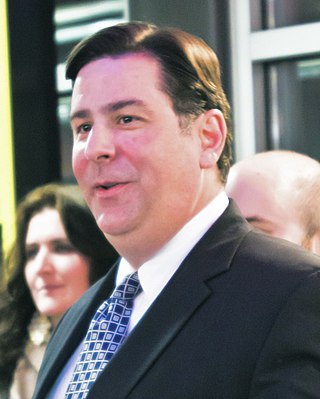
The 2013 Pittsburgh mayoral election took place on November 5, 2013. Democrat Bill Peduto was elected the 60th Mayor of Pittsburgh, Pennsylvania. The primary election was held on May 21, 2013. Incumbent Democratic Mayor Luke Ravenstahl, although eligible for a second full term, did not seek reelection as Mayor of Pittsburgh.

The 2017 United States elections were held, in large part, on Tuesday, November 7, 2017. This off-year election featured gubernatorial elections in Virginia and New Jersey, as well as state legislative elections in both houses of the New Jersey Legislature and in the Virginia House of Delegates. Numerous citizen initiatives, mayoral races, and a variety of other local elections also occurred. Special elections were also held for one seat of the U.S. Senate, representing Alabama, and six seats of the U.S. House of Representatives. The Democrats picked up the governorship in New Jersey and the Alabama Senate seat that was up for a special election. The governorship in Virginia and the six House seats that were up for special elections did not change party hands.
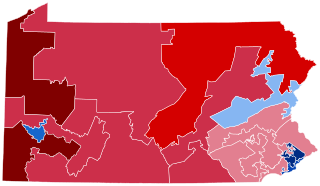
The 2016 United States House of Representatives elections in Pennsylvania were held on November 8, 2016, to elect the 18 U.S. representatives from the Commonwealth of Pennsylvania, one from each of the state's 18 congressional districts. The elections coincided with the 2016 U.S. presidential election, as well as other elections to the House of Representatives, elections to the United States Senate and various state and local elections. The primaries were held on April 26.

The 1951 Philadelphia municipal election, held on Tuesday, November 6, was the first election under the city's new charter, which had been approved by the voters in April, and the first Democratic victory in the city in more than a half-century. The positions contested were those of mayor and district attorney, and all seventeen city council seats. There was also a referendum on whether to consolidate the city and county governments. Citywide, the Democrats took majorities of over 100,000 votes, breaking a 67-year Republican hold on city government. Joseph S. Clark Jr. and Richardson Dilworth, two of the main movers for the charter reform, were elected mayor and district attorney, respectively. Led by local party chairman James A. Finnegan, the Democrats also took fourteen of seventeen city council seats, and all of the citywide offices on the ballot. A referendum on city-county consolidation passed by a wide margin. The election marked the beginning of Democratic dominance of Philadelphia city politics, which continues today.

The 1955 Philadelphia municipal election, held on Tuesday, November 8, involved contests for mayor, district attorney, all seventeen city council seats, among other offices. Citywide, the Democrats took majorities of over 130,000 votes, continuing their success from the elections four years earlier. Richardson Dilworth, who had been elected district attorney in 1951, was elected mayor. Victor H. Blanc, a city councilman, was elected district attorney. The Democrats also kept fourteen of seventeen city council seats, losing one district seat while gaining another, and kept control of the other citywide offices. The election represented a further consolidation of control by the Democrats after their citywide victories of four years earlier.

Elections are currently held every four years to elect the mayor of Hartford, Connecticut.
| Preceded by 1989 | Pittsburgh mayoral election 1993 | Succeeded by 1997 |